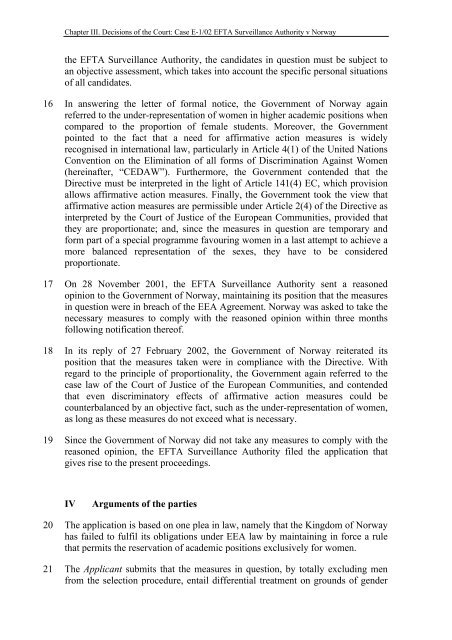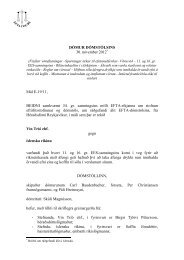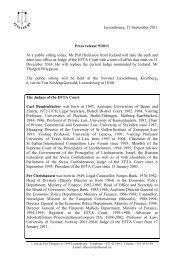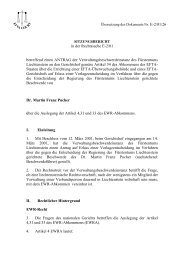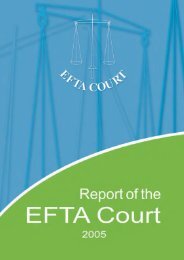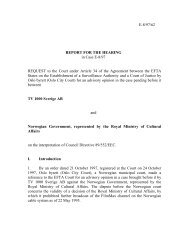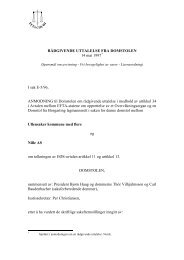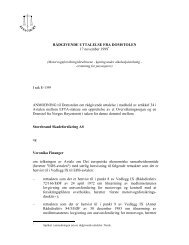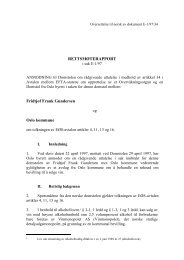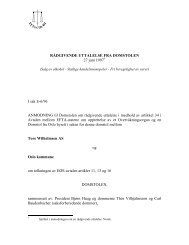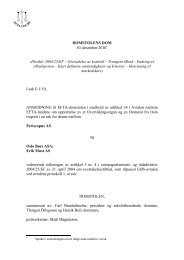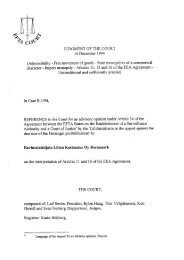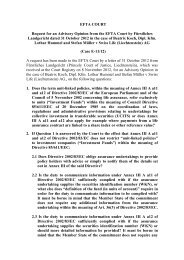- Page 1 and 2: Report of the EFTA Court 2003
- Page 3: Report of the EFTA Court 2003
- Page 6 and 7: A collection of the relevant legal
- Page 8 and 9: Chapter I. Administration of the Co
- Page 10 and 11: Chapter II. Judges and Staff II. Ju
- Page 12 and 13: Chapter II. Judges and Staff CURRIC
- Page 14 and 15: III. Decisions of the Court
- Page 16 and 17: Chapter III. Decisions of the Court
- Page 18 and 19: Chapter III. Decisions of the Court
- Page 22 and 23: Chapter III. Decisions of the Court
- Page 24 and 25: Chapter III. Decisions of the Court
- Page 26 and 27: Chapter III. Decisions of the Court
- Page 28 and 29: Chapter III. Decisions of the Court
- Page 30 and 31: VI Costs Chapter III. Decisions of
- Page 32 and 33: Chapter III. Decisions of the Court
- Page 34 and 35: Chapter III. Decisions of the Court
- Page 36 and 37: Chapter III. Decisions of the Court
- Page 38 and 39: Chapter III. Decisions of the Court
- Page 40 and 41: Chapter III. Decisions of the Court
- Page 42 and 43: Chapter III. Decisions of the Court
- Page 44 and 45: Chapter III. Decisions of the Court
- Page 46 and 47: Chapter III. Decisions of the Court
- Page 48 and 49: Chapter III. Decisions of the Court
- Page 50 and 51: Chapter III. Decisions of the Court
- Page 52 and 53: Chapter III. Decisions of the Court
- Page 54 and 55: Chapter III. Decisions of the Court
- Page 56 and 57: Chapter III. Decisions of the Court
- Page 58 and 59: Chapter III. Decisions of the Court
- Page 60 and 61: Chapter III. Decisions of the Court
- Page 62 and 63: Chapter III. Decisions of the Court
- Page 64 and 65: Chapter III. Decisions of the Court
- Page 66 and 67: Chapter III. Decisions of the Court
- Page 68 and 69: Chapter III. Decisions of the Court
- Page 70 and 71:
Chapter III. Decisions of the Court
- Page 72 and 73:
Chapter III. Decisions of the Court
- Page 74 and 75:
Chapter III. Decisions of the Court
- Page 76 and 77:
Chapter III. Decisions of the Court
- Page 78 and 79:
Chapter III. Decisions of the Court
- Page 80 and 81:
Chapter III. Decisions of the Court
- Page 82 and 83:
Chapter III. Decisions of the Court
- Page 84 and 85:
Chapter III. Decisions of the Court
- Page 86 and 87:
Chapter III. Decisions of the Court
- Page 88 and 89:
Chapter III. Decisions of the Court
- Page 90 and 91:
Chapter III. Decisions of the Court
- Page 92 and 93:
Chapter III. Decisions of the Court
- Page 94 and 95:
Chapter III. Decisions of the Court
- Page 96 and 97:
Chapter III. Decisions of the Court
- Page 98 and 99:
Chapter III. Decisions of the Court
- Page 100 and 101:
Chapter III. Decisions of the Court
- Page 102 and 103:
Chapter III. Decisions of the Court
- Page 104 and 105:
Chapter III. Decisions of the Court
- Page 106 and 107:
Chapter III. Decisions of the Court
- Page 108 and 109:
Chapter III. Decisions of the Court
- Page 110 and 111:
Chapter III. Decisions of the Court
- Page 112 and 113:
Chapter III. Decisions of the Court
- Page 114 and 115:
Chapter III. Decisions of the Court
- Page 116 and 117:
Kapitell III. Avgjørelser av Domst
- Page 118 and 119:
Kapitell III. Avgjørelser av Domst
- Page 120 and 121:
Kapitell III. Avgjørelser av Domst
- Page 122 and 123:
Kapitell III. Avgjørelser av Domst
- Page 124 and 125:
Kapitell III. Avgjørelser av Domst
- Page 126 and 127:
Kapitell III. Avgjørelser av Domst
- Page 128 and 129:
Kapitell III. Avgjørelser av Domst
- Page 130 and 131:
Kapitell III. Avgjørelser av Domst
- Page 132 and 133:
Kapitell III. Avgjørelser av Domst
- Page 134 and 135:
Kapitell III. Avgjørelser av Domst
- Page 136 and 137:
Kapitell Kapitell III. III. Avgjør
- Page 138 and 139:
Kapitell III. Avgjørelser av Domst
- Page 140 and 141:
Kapitell III. Avgjørelser av Domst
- Page 142 and 143:
Kapitell III. Avgjørelser av Domst
- Page 144 and 145:
Kapitell III. Avgjørelser av Domst
- Page 146 and 147:
Kapitell III. Avgjørelser av Domst
- Page 148 and 149:
Kapitell III. Avgjørelser av Domst
- Page 150 and 151:
Kapitell III. Avgjørelser av Domst
- Page 152 and 153:
Kapitell III. Avgjørelser av Domst
- Page 154 and 155:
Kapitell III. Avgjørelser av Domst
- Page 156 and 157:
Kapitell III. Avgjørelser av Domst
- Page 158 and 159:
Kapitell III. Avgjørelser av Domst
- Page 160 and 161:
Kapitell III. Avgjørelser av Domst
- Page 162 and 163:
Kapitell III. Avgjørelser av Domst
- Page 164 and 165:
Kapitell III. Avgjørelser av Domst
- Page 166 and 167:
Kapitell III. Avgjørelser av Domst
- Page 168 and 169:
Kapitell III. Avgjørelser av Domst
- Page 170 and 171:
Kapitell III. Avgjørelser av Domst
- Page 172 and 173:
Kapitell III. Avgjørelser av Domst
- Page 174 and 175:
Kapitell III. Avgjørelser av Domst
- Page 176 and 177:
Kapitell III. Avgjørelser av Domst
- Page 178 and 179:
Kapitell III. Avgjørelser av Domst
- Page 180 and 181:
Kapitell III. Avgjørelser av Domst
- Page 182 and 183:
Kapitell III. Avgjørelser av Domst
- Page 184 and 185:
Kapitell III. Avgjørelser av Domst
- Page 186 and 187:
Kapitell III. Avgjørelser av Domst
- Page 188 and 189:
Kapitell III. Avgjørelser av Domst
- Page 190 and 191:
Kapitell III. Avgjørelser av Domst
- Page 192 and 193:
Kapitell III. Avgjørelser av Domst
- Page 194 and 195:
Kapitell III. Avgjørelser av Domst
- Page 196 and 197:
Kapitell III. Avgjørelser av Domst
- Page 198 and 199:
Chapter III. Decisions of the Court
- Page 200 and 201:
Chapter III. Decisions of the Court
- Page 202 and 203:
Chapter III. Decisions of the Court
- Page 204 and 205:
Chapter III. Decisions of the Court
- Page 206 and 207:
Chapter III. Decisions of the Court
- Page 208 and 209:
Chapter III. Decisions of the Court
- Page 210 and 211:
Chapter III. Decisions of the Court
- Page 212 and 213:
Chapter III. Decisions of the Court
- Page 214 and 215:
Chapter III. Decisions of the Court
- Page 216 and 217:
Chapter III. Decisions of the Court
- Page 218 and 219:
Chapter III. Decisions of the Court
- Page 220 and 221:
Chapter III. Decisions of the Court
- Page 222 and 223:
Chapter III. Decisions of the Court
- Page 224 and 225:
Chapter III. Decisions of the Court
- Page 226 and 227:
Chapter III. Decisions of the Court
- Page 228 and 229:
Chapter III. Decisions of the Court
- Page 230 and 231:
Chapter III. Decisions of the Court
- Page 232 and 233:
Chapter III. Decisions of the Court
- Page 234 and 235:
Chapter III. Decisions of the Court
- Page 236 and 237:
Chapter III. Decisions of the Court
- Page 238 and 239:
Chapter III. Decisions of the Court
- Page 240 and 241:
Chapter III. Decisions of the Court
- Page 242 and 243:
Chapter III. Decisions of the Court
- Page 244 and 245:
Chapter III. Decisions of the Court
- Page 246 and 247:
Chapter III. Decisions of the Court
- Page 248 and 249:
Chapter III. Decisions of the Court
- Page 250 and 251:
Chapter III. Decisions of the Court
- Page 252 and 253:
Chapter III. Decisions of the Court
- Page 254 and 255:
Chapter III. Decisions of the Court
- Page 256 and 257:
Chapter III. Decisions of the Court
- Page 258 and 259:
Chapter III. Decisions of the Court
- Page 260 and 261:
Chapter III. Decisions of the Court
- Page 262 and 263:
Chapter III. Decisions of the Court
- Page 264 and 265:
Chapter III. Decisions of the Court
- Page 266 and 267:
Chapter III. Decisions of the Court
- Page 268 and 269:
Chapter III. Decisions of the Court
- Page 270 and 271:
Chapter III. Decisions of the Court
- Page 272 and 273:
Chapter III. Decisions of the Court
- Page 274 and 275:
Chapter III. Decisions of the Court
- Page 276 and 277:
Chapter III. Decisions of the Court
- Page 278 and 279:
Chapter III. Decisions of the Court
- Page 280 and 281:
Chapter III. Decisions of the Court
- Page 282 and 283:
Chapter III. Decisions of the Court
- Page 284 and 285:
Chapter III. Decisions of the Court
- Page 286 and 287:
Chapter III. Decisions of the Court
- Page 288 and 289:
Chapter III. Decisions of the Court
- Page 290 and 291:
Chapter III. Decisions of the Court
- Page 292 and 293:
Chapter III. Decisions of the Court
- Page 294 and 295:
Chapter III. Decisions of the Court
- Page 296 and 297:
Chapter III. Decisions of the Court
- Page 298 and 299:
Chapter III. Decisions of the Court
- Page 300 and 301:
Chapter III. Decisions of the Court
- Page 302 and 303:
Chapter III. Decisions of the Court
- Page 304 and 305:
Chapter III. Decisions of the Court
- Page 306 and 307:
Chapter III. Decisions of the Court
- Page 308 and 309:
Chapter III. Decisions of the Court
- Page 310 and 311:
Chapter III. Decisions of the Court
- Page 312 and 313:
Chapter III. Decisions of the Court
- Page 314 and 315:
Chapter III. Decisions of the Court
- Page 316 and 317:
Chapter III. Decisions of the Court
- Page 318 and 319:
Chapter III. Decisions of the Court
- Page 320 and 321:
Chapter III. Decisions of the Court
- Page 322 and 323:
Chapter III. Decisions of the Court
- Page 324 and 325:
Chapter III. Decisions of the Court
- Page 326 and 327:
Chapter III. Decisions of the Court
- Page 328 and 329:
Chapter III. Decisions of the Court
- Page 330 and 331:
Chapter III. Decisions of the Court
- Page 332 and 333:
Chapter III. Decisions of the Court
- Page 334 and 335:
Chapter III. Decisions of the Court
- Page 336 and 337:
CASES 1994 - 2002 CASE PARTIES TYPE
- Page 338 and 339:
15 E-4/96 Fridtjof Frank Gundersen
- Page 340 and 341:
30 E-3/98 Herbert Rainford-Towning
- Page 342:
46 E-9/00 EFTA Surveillance Authori


